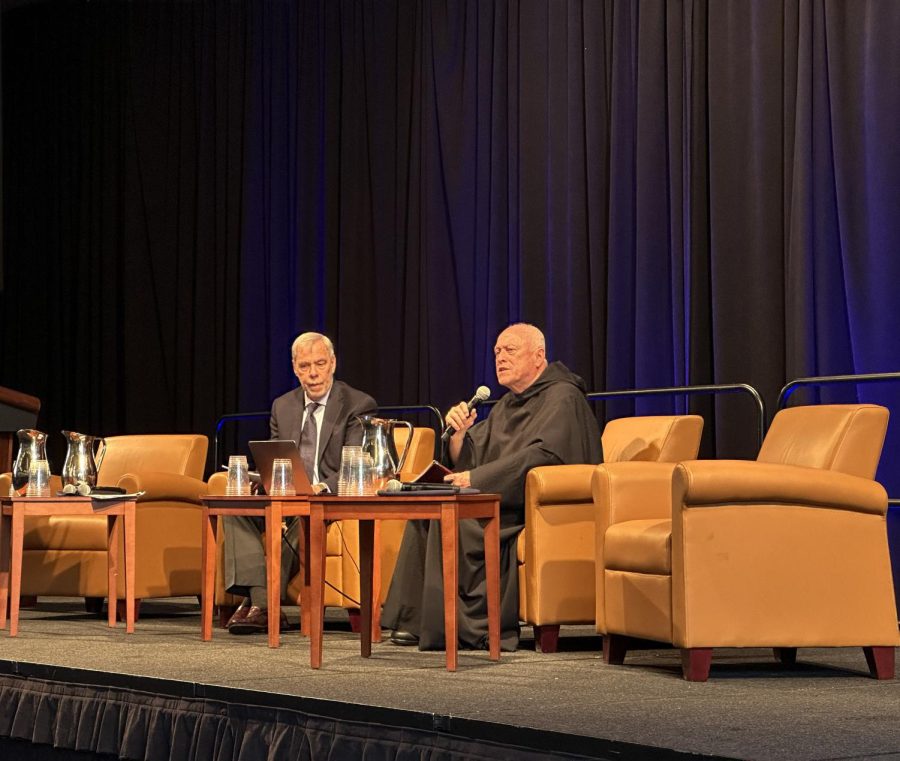“Peril and Hope”: Naomi Klein and Raj Patel Panel at the Anti-Poverty Symposium
Gabi Frank/ Villanovan Photography
Speakers at the University’s Annual Anti-Poverty Symposium
April 26, 2023
On Tuesday, April 18th, Villanova hosted its second-annual Anti-Poverty Symposium, an event that boasted the motto “Unitas in Action: Fighting Poverty and Living Sustainably.” There were a total of seven 50-minute panels, which spotlighted a variety of guests, from respected bishops to bestselling authors to founders of environmental organizations and more. The second panel honored three highly accomplished writers, educators and environmentalists: Naomi Klein, Raj Patel and Bill McKibben.
The panel addressed a variety of questions and issues surrounding the pressing issue of global climate change and the increasing need to address it. The discussion opened soberly with McKibben, the moderator.
“What can we realistically and legitimately hope for?” he asked the panel.
To answer this question, Patel frankly shared that he “has a very dim view of hope.” He went on to explain that hope often comes in the form of words and thoughts, not actions. Therefore, in his opinion, what matters even more than just having the idea of hope is the ability to take action to make change.
“Change is going to be inevitable, and [we] are going to win,” Patel said, to which the crowd responded with applause.
“Hope is something that we earn, not something we just wake up with,” Klein said.
Both panelists agreed on the point that hope is not a feeling one feels unwarranted, and instead must be supported with tangible cause and action. She continued to say that while she may not have hope in every moment, she does have humility– humility that she does not know exactly what will happen next. Indeed, in the unprecedented times in which we live, one can never be fully certain what will happen next regarding the climate crisis.
“I appreciated that the panelists’ discussion about hope was very real and did not seem superficial in any way,” freshman Jordyn Mann said. “I feel like so often we hear about blind hope, so to hear about thinking of the importance of a more physical course of action was really powerful.”
The panel also discussed the relevance of considering other issues in tandem with climate change. McKibben prompted Klein with the term “everything-ness” that she writes about in some of her works and asked her how we should go about talking about this all-including idea. Klein began the discussion by noting the impossibility of thinking of the climate crisis as an entirely differentiated issue from other, large social issues in play both nationally and globally
“When climate fighting is paired with fighting white supremacy, with fighting poverty, with fighting hunger, you don’t have to choose between caring about issues of the present and the issue of the abstract thing called ‘the planet,’” she stated, thus weaving together the seemingly separate matters. She described how, when all these smaller issues are portrayed as one, interlocking problem, people can band together and fight it in with the common goal of change.
Environmental justice emerged as one of the final topics covered by the panelists. Klein stated that, although actors in certain industries– such as the fossil fuel and big tech industries– in some cases know what they must do to fight climate change, they do not want to actualize those steps because it would jeopardize their social and economic hegemony. But it is not just the huge corporations that will have to concede their luxurious lifestyle, but “the over-consumers of us have to reckon with less,” Naomi Klein said.
Klein closed the panel with a powerful reflection on the role of social hierarchies within these crises, and the concept that every environmental decision made comes with detrimental human consequences.
“Fossil fuels are cheap because lives of certain groups around the world are treated as cheap,” Klein said, drawing the connection between the very real yet often understated human costs of the climate crisis. “The ranking of life in a pyramid is at the heart of this crisis. Instead, [we must recognize] we live in a circle.”
The panel explored a variety of concepts that related the symposium’s main themes of anti-poverty and sustainability to a multitude of other contexts. Patel and Klein’s views provided a clearer and more comprehensive view of these issues, providing a strong opening to the symposium.


